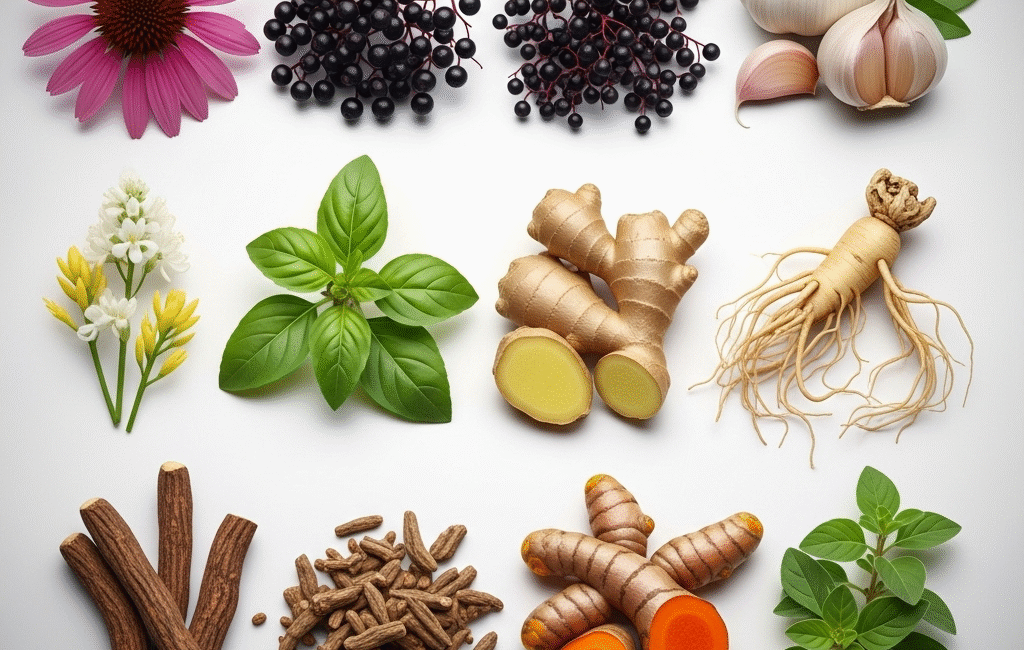Here are 10 herbs known for their immune-boosting properties herbs, along with explanations of how they are commonly used:
1. Echinacea (Echinacea purpurea)
- How to use: Echinacea is widely used to fight colds and respiratory infections. It’s commonly taken as a tea, tincture (a concentrated herbal extract), or in capsule or tablet form. It’s often recommended to start taking echinacea at the first sign of illness.
2. Elderberry (Sambucus nigra)
- How to use: Elderberries are rich in antioxidants and known for their antiviral properties, particularly against flu viruses. Elderberry syrup is a very popular preparation. You can also find elderberry in lozenges, gummies, teas, or capsules. It’s often taken when symptoms of a cold or flu begin, or for ongoing immune support during cold and flu season.
3. Garlic (Allium sativum)
- How to use: Garlic contains allicin, a compound known for its immune-enhancing and antimicrobial effects. It can be consumed raw or cooked in food. For a more potent effect, some people chop or crush raw garlic and swallow it (sometimes with honey) or add it to meals just before serving to preserve its active compounds. Garlic supplements in capsule or tablet form are also available.
4. Ginger (Zingiber officinale)
- How to use: Ginger has anti-inflammatory and antimicrobial properties. Fresh ginger can be grated or sliced and steeped in hot water to make a tea (often with lemon and honey). It can also be added fresh to juices, smoothies, and various dishes like stir-fries and soups. Ginger powder is used in cooking and can also be found in capsules.
5. Turmeric (Curcuma longa)
- How to use: Turmeric contains curcumin, a powerful anti-inflammatory and antioxidant compound. It’s a common spice in cooking, especially in curries. “Golden milk,” a warm drink made with turmeric, milk (or a non-dairy alternative), black pepper (which enhances curcumin absorption), and sometimes other spices like ginger and cinnamon, is a popular way to consume it. Turmeric can also be taken as a capsule or tincture.
6. Astragalus (Astragalus membranaceus)
- How to use: Astragalus is an adaptogenic herb used in Traditional Chinese Medicine to strengthen the immune system and help the body resist stressors. The dried root is typically used. It can be simmered in water to make a decoction (a long-boiled tea), added to soups and stews (the root is usually removed before eating), or taken as a tincture or in capsule form. It’s often used for long-term immune support.
7. Ginseng (Panax ginseng / Panax quinquefolius)
- How to use: Ginseng is known for its ability to help balance the immune system and fight fatigue. There are different types, like Asian ginseng (Panax ginseng) and American ginseng (Panax quinquefolius). The root is the part used. It can be consumed as a tea, by chewing small amounts of the dried root, or taken as a powder, capsule, or liquid extract.
8. Holy Basil (Ocimum sanctum or Tulsi)
- How to use: Holy Basil, also known as Tulsi, is revered in Ayurvedic medicine for its immune-modulating, anti-stress, and antimicrobial properties. The leaves are most commonly used to make a tea. Fresh leaves can also be chewed or added to food. It’s also available in powder, capsule, or tincture form.
9. Licorice Root (Glycyrrhiza glabra)
- How to use: Licorice root has antiviral and immune-stimulating properties. It’s often used to soothe sore throats and coughs. It can be made into a tea (decoction by simmering the root) or taken as a tincture or lozenge. It’s important to use licorice root in moderation and be aware of potential side effects with long-term or high-dose use, especially for individuals with high blood pressure. Deglycyrrhizinated licorice (DGL) is available and has fewer side effects.
10. Oregano (Origanum vulgare)
- How to use: Oregano, particularly oil of oregano, is known for its potent antimicrobial, antiviral, and antifungal properties due to compounds like carvacrol and thymol. Fresh or dried oregano leaves can be used in cooking. For a more concentrated dose, oil of oregano (which should be diluted as it’s very strong) can be taken in drops (often mixed with a carrier oil or in water) or in capsule form.
Important Considerations:
- Quality: The quality and concentration of active compounds in herbal preparations can vary. Purchase from reputable sources.
- Dosage: Follow recommended dosages on product labels or consult with a healthcare professional.
- Interactions: Herbs can interact with medications and may not be suitable for everyone, especially pregnant or breastfeeding women, or individuals with certain health conditions. It’s crucial to consult with a healthcare provider before starting any new herbal supplement.
- Not a Replacement: These herbs can support immune function but should not be seen as a replacement for a healthy lifestyle, including a balanced diet, regular exercise, adequate sleep, and stress management, or as a cure for any disease.

